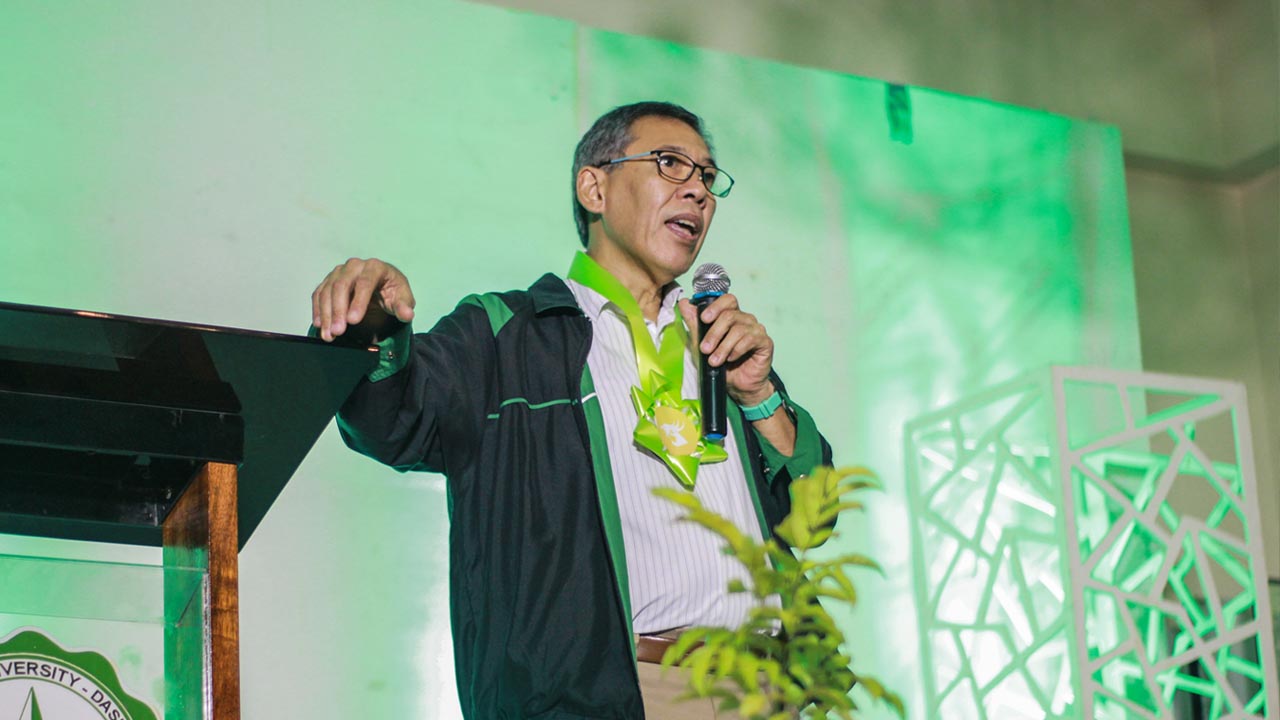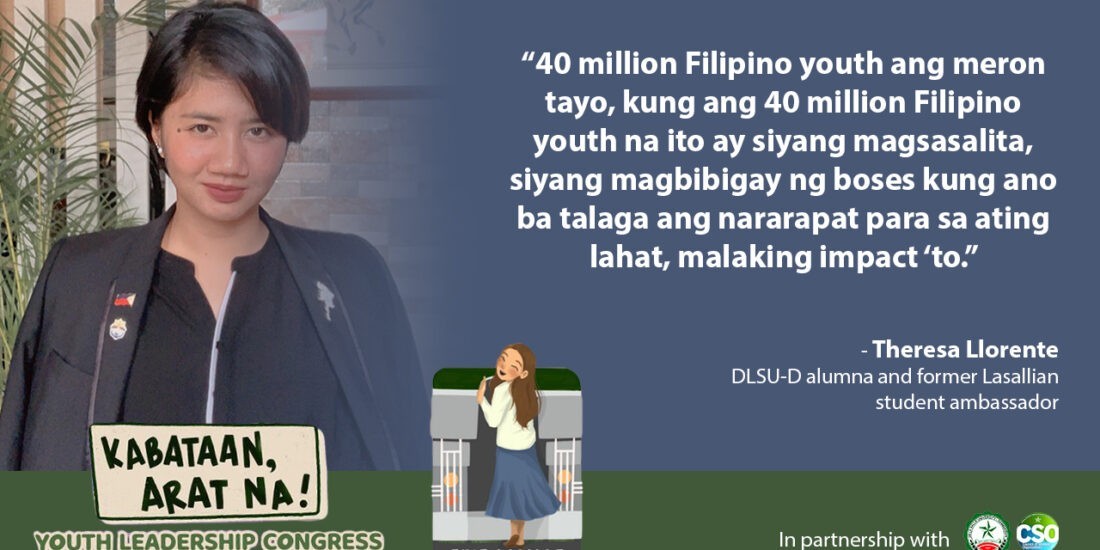Chel Diokno, Albert Puchero talk about generation gap at Connect the G.A.P seminar
With guest speakers Atty. Chel Diokno, founding dean of De La Salle University College of Law and Albert John Puchero of DLSU-D Alumni Association, the College of Liberal Arts and Communication Student Government (CLACSG), held the seminar “Connect the G.A.P.: The Peculiarity of a Baby Boomer and a Millennial” on October 16 at Salrial Hall.
The seminar aimed to educate the students about the gap of two different generations, which according to Project Head Charliemagne Asuncion is a way to enlighten the youth on how to be vocal without losing our Filipino values.

Chel Diokno to the youth: “The Philippines is yours”
One prominent topic of Diokno’s lecture would be the role of youth in the Philippines and how they hold the country’s future in their hands. “More than 50% of the Filipino population is between the age of 18 up to below 30,” Diokno said. “So isipin niyo, kabataan talaga ang Pinoy ngayon.”
Diokno discussed that in order to set the country in its rightful path, first we must educate the country’s future leaders: the youth. The gap between the current generation and Baby Boomers exists because there is an obvious clash of ideas, he said, and this gap just might be due to lack of respect and understanding.
He described his upbringing and how his parents never treated him as a kid, but rather, as an equal. Conversations were shared with respect and dignity—a habit Diokno also continued with his children the moment he grew up to a parent himself.
“When I talk to young people, I never look down on you,” Diokno said. “Many of you are even wiser than my generation. You are never too young to know the truth. You are never too young to know what is right and what is wrong. And I respect that, I believe that, and I trust in all of you.”
Additionally, Diokno shared how 53% of the registered voters are comprised of Filipinos aged 18 to 39 years old, which goes to show how much of the country’s fate depends on the youth.
“I was 11 years old when the Martial Law was declared, so I got to see the loss of our democracy firsthand,” Diokno reminisced. “And you know who suffered the most and who fought the hardest for our democracy? It was the youth. The young people of my generation.”
Just as the youth fought hard back then, Diokno recognized the same fervent need for change even now—and how despite all the odds, the youth can stand to fight.
“I don’t see any difference,” he reassured, on comparing the youth of the past and the youth today. “I think you are just as idealistic, you are just as energetic as the young people in my generation.”

Diokno also answered the question as to how the youth could be more effective in nation-building, wherein he had quoted his late father, Jose W. Diokno, about the pressing need for a solid national consciousness and a national conscience. National consciousness, he explained, is being aware of the country’s history, sacrifices, diversity, and commonality, pertinent issues such as poverty and endangered environment. Meanwhile, national conscience is derived from the dignity that comes from staying true to oneself whoever you are. He also listed inclusiveness as a part of this, as people need to work together and share what they have, instead of amassing power and wealth for themselves.
Diokno had also mentioned in the earlier part of the program that what happens today is every man for himself, and that we live in a society of exclusiveness. With this, Diokno recalled a young girl, aged 22, who imparted wisdom that reaches not just the Generation Z and Millenials, but also the Baby Boomers:
“Our politicians do not deserve our loyalty. Our country deserves our loyalty.”
MEDIA: Sword of the youth
“All true leaders have learned to say no to be good, in order to say yes for the best,” the second speaker, Albert John Puchero, opened his talk quoting John Maxwell.
“Baby Boomers are more on taking care of their health, Generation X are more on being anti, busy, and cynical. On the next generation, Generation Y are more focusing on adapting the technology. Lastly, the Generation Z, is born with the digitals. Sila ‘yong mga batang hindi na totoong laruan ‘yong hawak at makikita mo sa kanila, ibang klase na sila,” Puchero explained.
He described that the youngest generations are no less ambitious than their predecessors, 57% are the ones who want to travel to see the world, while the 49% are those people who want to get married and have a normal family.
Puchero also discussed the future of the Gen Z, but he wants to change it in actuality. He doesn’t want the youth to experience too much pampering as just he stated that “I want the youth to grow with their own mistake.”

He wants the youth to know more about themselves. Similar to Diokno, he doesn’t want children to be treated like babies, he wants them treated the same way they act but with respect and dignity, as it is very negotiable to have free communication with respect.
As he tackled about the youth in the entirety of his talk, he also mentioned the emerging culture among them: “laban sa kalsada, laban sa media.”
“Dati ‘yong laban na alam natin sa kalsada lang, … Mga taong handang iharap ‘yong mga mukha nila sa kalsada. Pero ngayon iba na eh, laban na talaga sa media,” Puchero compared, explaining that the youth uses technology as a weapon. “Itong mga gadgets na ito ang nagiging kagamitan ng mga youth to serve and to fight for the country.”
As much as he understands the people of today, he wants this generation not only to connect but to acknowledge all the generations for them to understand, even elders.
Connect the GAP: Baby Boomers, Millennials, and Generation Z
Remarkably, Puchero offered a refreshing perspective in line with the growing generation gap: there is no such thing as a connecting the gap, he said, but rather an acknowledgement of its existence.
On Puchero’s talk, he also said that pride comes with age, and one good manifesting example is the saying“Papunta ka pa lang, pabalik na ako.” He then talked about how the generation gap can be dealt with through communication.
He even compared the relationship of the Baby Boomers and Generation Z to a rubber band, where opposing views often create tension to which both sides must adapt and adjust to keep itself from snapping. This rubber band, driven with tension, also spurs creativity, as rubber band helps tie things together, and keep things from falling apart.
Just as Diokno empowered the youth to speak up and let their voices be heard, mutual respect and understanding will serve as a bridge that will help both generations work on one goal: the betterment of this country.





